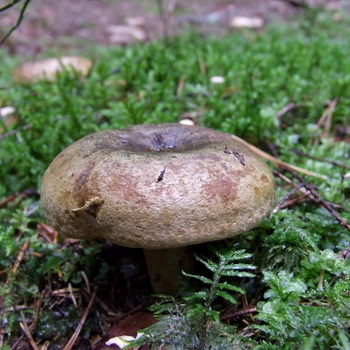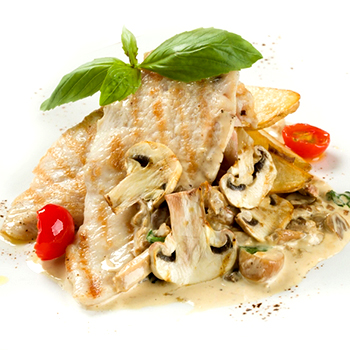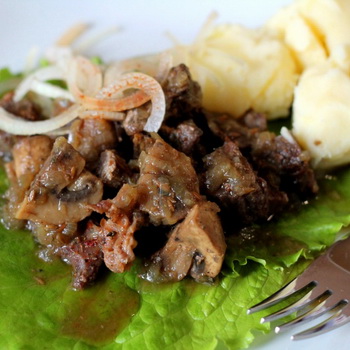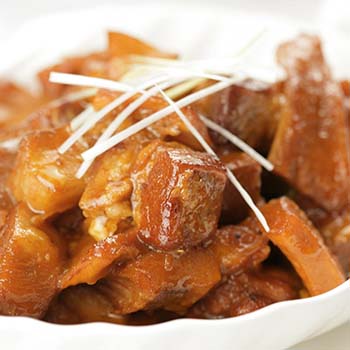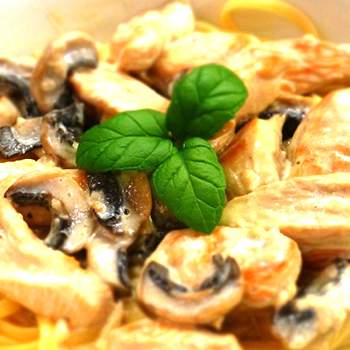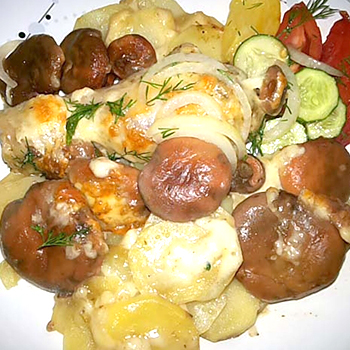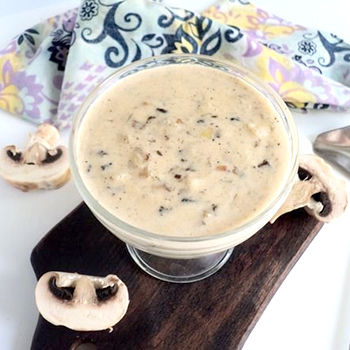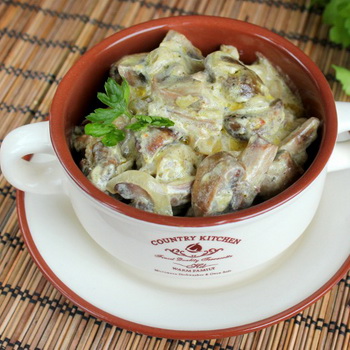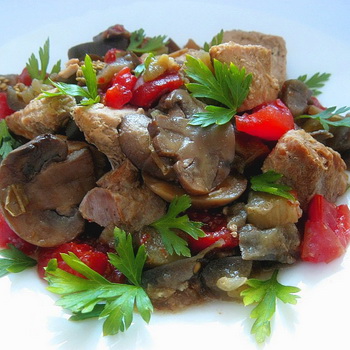Porcini mushrooms: benefits and harms for the human body, is there really an effect
 There are legends among the people about the miraculous properties of many forest gifts. According to scientists, the benefits of porcini mushrooms are greatly exaggerated, although they have a certain nutritional value. The benefits and harms of the porcini mushroom are mainly discussed in the light of recent reports of mutations among representatives of the forest underground kingdom of mushrooms. Now, against the backdrop of the ups and downs with the weather, many wound edible species are dangerous and poisonous. But nevertheless, the benefits of porcini mushrooms for the human body exist, and it lies in the saturation of its pulp with light and well-absorbed vegetable protein. In addition, the structure of boletus contains a large amount of vitamins, amino acids, and minerals. You can read about the benefits and harms of porcini mushrooms for the modern human body on this page - the material contains arguments for and against their use in large quantities.
There are legends among the people about the miraculous properties of many forest gifts. According to scientists, the benefits of porcini mushrooms are greatly exaggerated, although they have a certain nutritional value. The benefits and harms of the porcini mushroom are mainly discussed in the light of recent reports of mutations among representatives of the forest underground kingdom of mushrooms. Now, against the backdrop of the ups and downs with the weather, many wound edible species are dangerous and poisonous. But nevertheless, the benefits of porcini mushrooms for the human body exist, and it lies in the saturation of its pulp with light and well-absorbed vegetable protein. In addition, the structure of boletus contains a large amount of vitamins, amino acids, and minerals. You can read about the benefits and harms of porcini mushrooms for the modern human body on this page - the material contains arguments for and against their use in large quantities.
Are there any health benefits of porcini mushrooms?


 Despite the fact that mushrooms add variety to our menu, increasing the taste of other dishes, their nutritional value is low: they are poorly absorbed due to the large amount of fiber containing chitin, which is not digested by itself, and makes it difficult for enzymes to access nutrients contained into the chitinous shell.
Despite the fact that mushrooms add variety to our menu, increasing the taste of other dishes, their nutritional value is low: they are poorly absorbed due to the large amount of fiber containing chitin, which is not digested by itself, and makes it difficult for enzymes to access nutrients contained into the chitinous shell.
 Whether there is any benefit in porcini mushrooms depends on how much nitrogenous components are absorbed. The high content of extractive and aromatic substances in mushrooms enhances the secretion of digestive juices, stimulating the secretory function of the gastric glands, mushroom decoctions cause a great sokogonny effect. That is why mushroom dishes are not used in medical nutrition. For people suffering from acute and chronic gastrointestinal diseases, including pancreas, peptic ulcer, gastritis, kidney and liver diseases (cholecystitis, hepatitis, renal failure), metabolic disorders, mushrooms are contraindicated, they cannot be eaten.
Whether there is any benefit in porcini mushrooms depends on how much nitrogenous components are absorbed. The high content of extractive and aromatic substances in mushrooms enhances the secretion of digestive juices, stimulating the secretory function of the gastric glands, mushroom decoctions cause a great sokogonny effect. That is why mushroom dishes are not used in medical nutrition. For people suffering from acute and chronic gastrointestinal diseases, including pancreas, peptic ulcer, gastritis, kidney and liver diseases (cholecystitis, hepatitis, renal failure), metabolic disorders, mushrooms are contraindicated, they cannot be eaten.
 It is not recommended to use mushroom broth for people suffering from hypertension due to the large amount of extractive substances in it. But mushroom broths (without mushrooms) are allowed by doctors in case of achilia (absence of hydrochloric acid in gastric juice), if there is no inflammation in the stomach. You can eat mushrooms and mushroom soups for patients with diabetes mellitus. Mushroom dishes (boiled and fried) should only be eaten fresh. After standing for about 1–2 days, they become tasteless and even unhealthy. Mushrooms are food for healthy people. But it should be remembered that an excessive amount of eaten mushrooms in healthy people can disrupt the activity of the stomach and intestines. And if the mushrooms were old or poorly processed, then, even if they are not poisonous, they often cause poisoning.
It is not recommended to use mushroom broth for people suffering from hypertension due to the large amount of extractive substances in it. But mushroom broths (without mushrooms) are allowed by doctors in case of achilia (absence of hydrochloric acid in gastric juice), if there is no inflammation in the stomach. You can eat mushrooms and mushroom soups for patients with diabetes mellitus. Mushroom dishes (boiled and fried) should only be eaten fresh. After standing for about 1–2 days, they become tasteless and even unhealthy. Mushrooms are food for healthy people. But it should be remembered that an excessive amount of eaten mushrooms in healthy people can disrupt the activity of the stomach and intestines. And if the mushrooms were old or poorly processed, then, even if they are not poisonous, they often cause poisoning.
 Porcini mushrooms are the healthiest. The health benefits of porcini mushrooms: they have more protein than other forest mushrooms, but the content of vitamin PP in them is 2 times less than in mushrooms, and vitamin B2 is less than in aspen mushrooms.
Porcini mushrooms are the healthiest. The health benefits of porcini mushrooms: they have more protein than other forest mushrooms, but the content of vitamin PP in them is 2 times less than in mushrooms, and vitamin B2 is less than in aspen mushrooms.
Mushrooms are useful for the prevention of diabetes.
 They have a very low glycemic index - 10. This means that mushrooms do not dramatically increase blood glucose levels and do not overload the pancreas. Mushrooms help you lose weight. Because they are low in calories - 17–25 kcal per 100 g. And mushrooms take a long time to digest, due to which they create a feeling of satiety for a long time. You shouldn't eat mushrooms for breakfast. Because they are quite heavy food, they are difficult to digest. In addition, mushrooms contain a lot of tryptophan, which has a hypnotic effect. Mushrooms are healthier to eat for lunch or dinner. Mushrooms improve the functioning of the nervous system.Mushrooms contain B vitamins, which are essential for a normal nervous system. Consuming mushrooms thins the blood, lowers cholesterol, activates lymphocytes, and increases the immune system's production of alpha interferon, tumor necrosis factor (TNF), and interleukins-1 and interleukins-2. These substances help the body to fight off cancerous tumors.
They have a very low glycemic index - 10. This means that mushrooms do not dramatically increase blood glucose levels and do not overload the pancreas. Mushrooms help you lose weight. Because they are low in calories - 17–25 kcal per 100 g. And mushrooms take a long time to digest, due to which they create a feeling of satiety for a long time. You shouldn't eat mushrooms for breakfast. Because they are quite heavy food, they are difficult to digest. In addition, mushrooms contain a lot of tryptophan, which has a hypnotic effect. Mushrooms are healthier to eat for lunch or dinner. Mushrooms improve the functioning of the nervous system.Mushrooms contain B vitamins, which are essential for a normal nervous system. Consuming mushrooms thins the blood, lowers cholesterol, activates lymphocytes, and increases the immune system's production of alpha interferon, tumor necrosis factor (TNF), and interleukins-1 and interleukins-2. These substances help the body to fight off cancerous tumors.
Dried porcini mushrooms: benefits and harms
 The benefits and harms of dried porcini mushrooms are currently being actively discussed. There is an opinion that they allow for the prevention of oncology. Eat mushrooms with vegetables on a regular basis to prevent cancer and boost your immune system. The only thing, just eating a raw or even fried mushroom is not enough - you need to "extract" the substances necessary for prevention or treatment - mushroom polysaccharides. To do this, you need to cook soups from mushrooms and eat mushroom broths. In this case, the polysaccharides from the mushroom wall - chitin - will be able to go into the broth and work for our immunity.
The benefits and harms of dried porcini mushrooms are currently being actively discussed. There is an opinion that they allow for the prevention of oncology. Eat mushrooms with vegetables on a regular basis to prevent cancer and boost your immune system. The only thing, just eating a raw or even fried mushroom is not enough - you need to "extract" the substances necessary for prevention or treatment - mushroom polysaccharides. To do this, you need to cook soups from mushrooms and eat mushroom broths. In this case, the polysaccharides from the mushroom wall - chitin - will be able to go into the broth and work for our immunity.

Studies by Australian scientists have shown that the risk of breast cancer in women is reduced by 64% for those who ate 10 g of mushrooms daily.
 There is no need to look for large overseas rarities, our porcini mushroom has a depressing effect on malignant tumors, especially spruce. This has already been confirmed experimentally. The benefit of dried porcini mushrooms is that the powder from them retains almost all of its healing properties. It is useful to take 1 tsp. powder, washed down with water, 3 times a day 30-40 minutes before meals. Tincture from fresh hats (fill a full jar with vodka to the top, insist for 3 weeks) can be drunk 1 tsp. 3-4 times a day before meals in courses of 3 weeks, a break of 7 days. Topically, you can treat skin cancer, frostbite, burns.
There is no need to look for large overseas rarities, our porcini mushroom has a depressing effect on malignant tumors, especially spruce. This has already been confirmed experimentally. The benefit of dried porcini mushrooms is that the powder from them retains almost all of its healing properties. It is useful to take 1 tsp. powder, washed down with water, 3 times a day 30-40 minutes before meals. Tincture from fresh hats (fill a full jar with vodka to the top, insist for 3 weeks) can be drunk 1 tsp. 3-4 times a day before meals in courses of 3 weeks, a break of 7 days. Topically, you can treat skin cancer, frostbite, burns.
General medicinal properties of porcini mushrooms:

- antitumor effect through enhancing the mechanism of antitumor resistance of the body;
- targeted activation of various immune executive elements;
- an increase in NK-cell activity, an increase in the formation of cytotoxic T-lymphocytes (CTL), activation of macrophages; increasing their life cycle;
- potentiation of various lymphokines (interleukin 1,2 and 6);
- an increase in the synthesis of a-TNF (tumor necrosis factor);
- an increase in the production of interferon-a and an improvement in the effect of interferon-y by 2-4 times;
- increased production of perforins and granzymes;
- restoration of reduced immunological reactivity, which is always observed with radiation and chemotherapy;
- counteracting the depressive effects of cytostatics on the number of white and red blood cells;
- with chemotherapy and radiation, relief of symptoms such as weakness, anorexia, vomiting, dry mouth, spontaneous sweating and pain;
- immunomodulation;
- analgesic effect;
- anti-inflammatory properties;
- hepatoprotective effect - improving the functional state of the liver, reducing enzymopathy.



